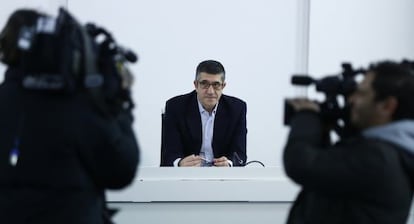Veteran Basque Socialist could be new speaker in Spanish Congress
PP, PSOE and Ciudadanos head towards agreement over Patxi López

Patxi López, a Socialist politician who was the Basque premier between 2009 and 2012, could be Spain’s new congressional speaker.
The 56-year-old López, a veteran of Spanish politics, has emerged as somewhat of a consensus figure that might bring together, if only momentarily, the parliamentary forces that emerged from the inconclusive general election on December 20.
At the very least, he is not meeting with head-on rejection. And that is no small achievement at a time when no party seems to have enough traction to form a government, either alone or in coalition with others. If no majority is formed, Spain will be forced to hold a new election.
The rules say quite clearly that parties which did not compete against each other at elections cannot have different groups”
Socialist politician Patxi López
With parliament scheduled to hold its constituent session on Wednesday, parties were scrambling to close deals the day before.
The Popular Party (PP), the Socialists (PSOE) and Ciudadanos on Tuesday were heading towards an agreement that would see López sworn in as speaker and the PSOE also occupying one of the deputy speaker spots on the congressional presiding committee. Ciudadanos and Podemos would each have two spots on the eight-member committee and the PP would have two or three, with the possibility that it may give up one of those to a nationalist party.
Democràcia i Llibertat, the new brand for the Catalan nationalist party Democratic Convergence (CDC) and two associates, has already expressed support for López. The Basque Nationalist Party (PNV) and the radical Bildu will state their positions later on Tuesday.
Barcelona mayor asks Socialists for alternative to referendum
The Socialist Party (PSOE) and Podemos are arguing over more things than the number of groups the latter may have in Congress.
Barcelona Mayor Ada Colau, whose party Barcelona en Comú ran in tandem with Podemos at the May municipal election, wants to hear some proposals from the Socialists regarding the future of the region.
While Podemos defends the right to hold a binding referendum on self-rule, the Socialists reject it.
Colau is now asking the PSOE “to choose between the bunker represented by the PP” and “dialogue” with Podemos.
“What we expect from the Socialists is a parallel proposal; we expect the PSOE to show a sense of state, and if it does not want a referendum, then to put an alternative offer on the table,” said party sources.
The main problem lies with Podemos, which is rejecting the agreement. The anti-austerity party earned 69 seats at the election, but that figure is the result of adding the seats for Podemos proper and those obtained by “sister” parties in Galicia (six seats), Valencia (nine), Catalonia (nine).
As such, Podemos wants to have four separate groups in Congress, which would mean more subsidies, speaking time, and control over committees than if it were to organize as a single delegation.
The PSOE has already ruled out this possibility, noting that house rules were modified in the 1980s to prevent such a move.
“The rules say quite clearly that parties that did not compete against each other at elections cannot have different groups,” said López.
Ciudadanos and the PP, which won the most seats at the election (123) but not enough for an absolute majority, also oppose more than one group for Podemos.
Candidates to head both Congress and the Senate will be officially presented later on Tuesday. The Senate position will be held by the PP, which held on to its majority there.
PSOE leader Pedro Sánchez, for his part, said on the SER radio network that “negotiating means yielding, but within the lines set by the rules of Congress.”
English version by Susana Urra.
Tu suscripción se está usando en otro dispositivo
¿Quieres añadir otro usuario a tu suscripción?
Si continúas leyendo en este dispositivo, no se podrá leer en el otro.
FlechaTu suscripción se está usando en otro dispositivo y solo puedes acceder a EL PAÍS desde un dispositivo a la vez.
Si quieres compartir tu cuenta, cambia tu suscripción a la modalidad Premium, así podrás añadir otro usuario. Cada uno accederá con su propia cuenta de email, lo que os permitirá personalizar vuestra experiencia en EL PAÍS.
¿Tienes una suscripción de empresa? Accede aquí para contratar más cuentas.
En el caso de no saber quién está usando tu cuenta, te recomendamos cambiar tu contraseña aquí.
Si decides continuar compartiendo tu cuenta, este mensaje se mostrará en tu dispositivo y en el de la otra persona que está usando tu cuenta de forma indefinida, afectando a tu experiencia de lectura. Puedes consultar aquí los términos y condiciones de la suscripción digital.








































